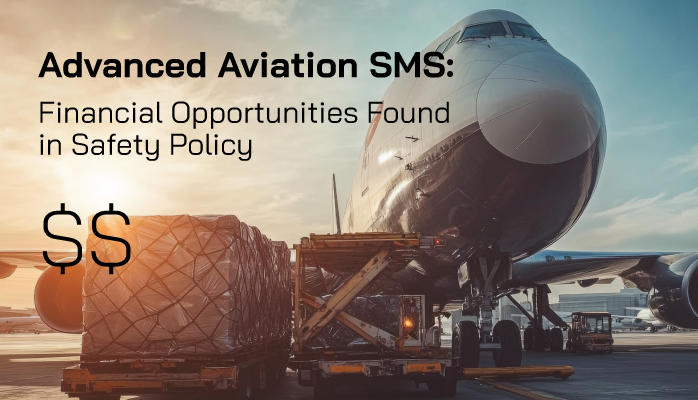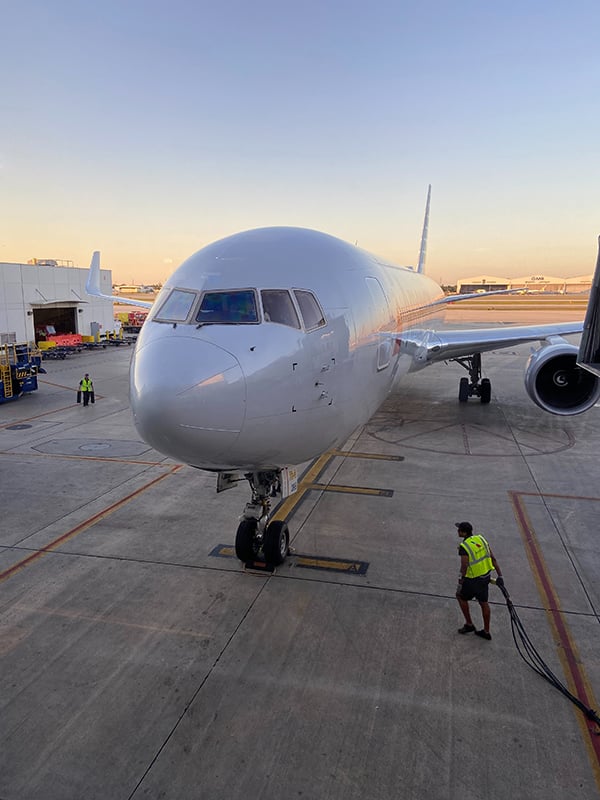Passing Audits but Failing Financial Performance

Smaller aviation service providers have adopted a not-so-secret weapon that can provide financial benefits, but they are not using it effectively.
Aviation SMS possesses extremely powerful risk management workflows that can level the playing field for smaller operators with business acumen. Before the SMS mandate, smaller operators lacked both the size and sophistication required to benefit financially from implementing quality management systems that facilitate continuous improvement. This has changed!
Since 2006, operators have begun to implement aviation SMS to comply with regulatory requirements; however, a clear, yet disturbing pattern has been developing across the world since 2007.
What do we see?
Whenever safety managers implement aviation safety management systems (SMS) as "safety-only-systems" to satisfy regulatory requirements, they inadvertently emasculate their SMS. Consequently, expected strategic business opportunities slip away forever, not to mention preventable losses from damage and many other benefits, such as:
- Reduced turnover;
- Improved employee morale; and
- Engaged employees working toward shared prosperity.
The short list above includes ambiguous, difficult-to-measure benefits that every manager hears at least three times each month. How is this any different? Where is the real money?
Related Aviation SMS Articles
- What Is Advanced Aviation SMS? -> Safety Management Systems
- Advanced Aviation SMS: Seek Permission Before Focusing on SMS Profits
- Advanced Aviation SMS: Generating Profits - First Steps
Passing Audits as Primary Aviation SMS Objective

During initial SMS implementation activities, safety managers are not overly concerned about future, pie-in-the-sky financial benefits when they are assigned to implement an audit-worthy, regulatory-compliant aviation SMS. Their focus is upon satisfying SMS audit requirements, as these requirements shape both operators' behaviors and activities as they strive to comply.
Safety teams succeed through compliance, thereby successfully safeguarding operating certificates.
Safety teams have an objective: implement and maintain an aviation SMS to prevent business disruptions.
Consequently, safety teams focus on the "assigned safety objective" and consistently ignore the low-hanging fruit that comes with every aviation SMS. This low-hanging fruit comes in the form of incidental opportunities identified during routine, obligatory risk management processes. This is really "low-hanging fruit" because operators are already paying handsomely for the SMS and hopefully practicing the risk management workflows.
Since safety managers are rarely trained business professionals, they simply don't know how to take advantage of these missed opportunities.
How can operators make real money from this relatively recent regulatory requirement?
There is a relatively easy way. We need to change our focus.
When you ask for safety, expect safety.
If you expect opportunities, ask for continuous improvement.
How to Uncover Opportunities in Aviation SMS Implementations
It is obvious to any bystander that safety managers and accountable executives were not excited to implement aviation SMS as originally designed by the founders. They complied! That is a fair statement, yet they are missing the intent. These actors see SMS obligations as another business hurdle that adds no immediate financial promise to themselves!
Financial opportunities are there, but short-sighted managers appear blinded by SMS requirements. After learning to comply, safety teams lack the energy and desire to upset the "audit-approved SMS." Subsequently, SMS for these companies stagnates and becomes downgraded to the status of a now obligatory, often ignored, legacy safety program that every company has, but expects little from. We have returned to highly-engineered "system safety" that has always lacked accountability and resonating safety and quality promotion campaigns.
How can we expect change? We need to share ideas on how to acquire these financial incentives and expand the scope of the SMS. Safety managers cannot be expected to implement systems returning financial benefits when their focus has been shifted away from income-generating mindsets to:
- "safety first;" or
- "SMS auditor first."
To talk about MONEY, MONEY, MONEY seems almost shameful to some zealot safety managers who totally embrace "Safety." It does not matter. If you don't start caring about your money, don't worry. Your SMS auditor isn't worried about your money either. The point is that you need to think about your money/profits/opportunities. The other actors have their own interests. When you leave money on the table, do you think they care?
There is only one real purpose in this Advanced Aviation SMS series: showing the way to the money using your SMS!
My personal pay value for providing this series is improved systemic aerospace safety. When your aviation SMS becomes a revenue-generating tool that visibly benefits your organization, our global aviation system becomes safer.
When you become successful, my objectives are being fulfilled. I know you won't fully embrace aviation SMS until your organization realizes the financial benefits that you can directly attribute to your SMS. Once you do, I'm certain you will want MORE SMS, MORE SMS, and MORE SMS!
By the way, I'm not asking you to buy anything. I have ideas that could be sold, but that is not my game.
Accountable Executives Communicate Via Policy
This article picks up from a preceding article about why 95% of aviation SMS implementations fail to generate financial returns because they chose the wrong safety policy. Safety policy shapes culture and drives organizational safety goals and objectives. Safety policy comes straight from the top, i.e., the accountable executive.
To modify the scope of an aviation SMS implementation, one of the first steps will be to review, modify, and communicate the safety policy.
The argument states that when safety managers were charged to implement a regulatory-compliant SMS, they focused on their assigned task and followed a prescribed blueprint. In aviation SMS, the standard blueprints are the industry-accepted Gap Analysis and SMS Implementation plans.
By following the "provided blueprint," any operator withstands an
- SMS regulatory audit;
- SMS audit by clients (oil companies, government agencies); or
- SMS audit from standards-setting bodies, such as IATA or IS-BAO.
For over a dozen years, safety managers have followed recommended guidance that efficiently satisfied the business objective of implementing a regulatory-compliant aviation SMS. Almost the entirety of this guidance explicitly focused on safety. To support this bold claim, we provided these freely available resources on our websites since 2008. But there is a problem.
A change is required. I have a solution.
What's Next in Aviation SMS Evolution?
For most aviation service providers, the business objective of an audit-worthy SMS has been satisfied and now everybody is smoking cigarettes and wondering "What happens next?"
For many managers and accountable executives, their aviation SMS is operating on auto-pilot. More pressing concerns have replaced the previous SMS crisis. Instead of wondering "what happens next," these managers may feel a sense of accomplishment that they have "passed the SMS hurdle" and can now safely focus on either:
- the next fire; or
- business initiatives that will bring home the real money!
I can confidently state that "you are not yet done." You are leaving easy money on the table! Let's pick it up and maximize the return on your SMS investment. It will only take a few tweaks to start seeing results. You are already doing most of the work!
Expanding Scope to Embrace Safety Through Quality
As one of the first steps, the standard, obligatory safety policy will need to be changed from strictly "safety-focused" to an integrated safety and quality policy.
What will these policy changes look like? One approach would be to consider your original implementation for insights. Where did your SMS start? We'll explore this, as your implementation style plays an important role. Differing implementation styles require slightly different strategies and "personal touches."
When I speak of quality, I'm not talking about improving the brand of peanuts offered during catering. Quality must be accompanied by a valid business case. We want managers constantly asking "How can we make it better?" This is one powerful source of opportunities.
Related Aviation SMS and QMS Articles
- Moving From Quality Management to Integrated SMS and QMS Systems
- 5 Most Important Ways to Integrate Aviation SMS and QMS
- 5 Easy Ways to Combine QMS and SMS in Aviation Operations
Policy Changes Affected by Implementation Style – Check the Box?

Since the early years of mandatory SMS, my favorite "find-value-anywhere-speech" embraced the virtues of integrated safety-and-quality management systems. Many safety professionals agree but have also seen a lukewarm response.
Integrated SMS and QMS have been a tough sell to all except the largest organizations. To larger, more technically sophisticated operators, SMS data management is considerably less burdensome as they can modify their extant quality management systems to include SMS requirements.
For operators already supporting data management strategies for their quality management systems (QMS), the adoption of safety was as easy and natural as adding other types of concerns, including:
- environmental;
- operational;
- OSHA or OHSA; or
- security.
Smaller companies naturally employ few "business analysts." Consequently, management comes from the operations' rank and file. Operational managers at smaller companies seldom attend business schools and subsequently enjoy less exposure to both:
- Quality management systems; and
- Quality management principles.
Considering these two distinct business mindsets between larger and smaller operators, one can logically arrive at why larger companies are more apt to financially succeed with their SMS implementations.
Larger companies have larger business aptitudes! Consequently, larger companies are more inclined to include flowery language that capitalizes on safety through quality versus the strict, dry, regimented "safety-management-approach" that causes operators to become distracted from their main business purpose: to make money!
To proceed with the Advanced SMS Series, we'll include a step to "Modify Safety Policy."
Don't use the safety policy templates below. If you have, we'll discuss why you should change them. However, these policies are useful for review if you wish to see how they could be reshaped to become more powerful.
Final Thoughts on Self-Limiting Safety Policy
To quickly review our progress, we have realized:
- Aviation SMS was designed to return financial benefits via cost-benefit analyses;
- Accountable executives must be engaged before seeking financial gains through the SMS;
- Senior managers must change the culture from the ignored "safety-specific" to "safety-through-quality;"
- Safety policy requires restructuring to communicate the change of direction and shape culture.
Before you rush in and change your safety policy, consider the message you have already sent, as well as the inspiring message you wish to share. There were obviously problems with the original that hindsight can illuminate.
I have another topic that relates to this point, but there isn't room for me to lay it out in this article. Look for my next article on reviewing your SMS implementation styles to learn where you came from.
The core message of this article is to demonstrate why the Safety Policy has handicapped your aviation SMS from achieving the financial rewards envisioned by the creators of this amazing system! SMS rules!
SMS Rules! There is a lot of potential here. Can you see it yet?
Sustainable SMS Requires Automated Processes
When your risk management processes are not easy, they are not sustainable. Modern purpose-built aviation SMS databases save time and money. Furthermore, the right ones will help you make more money! SMS Pro has all the automated tools to:
- Excel at SMS audits in record time; and
- Identify, capture, and execute coincidental opportunities.
Learn how you can benefit. Explore these demo videos.
Last updated in January 2025.







